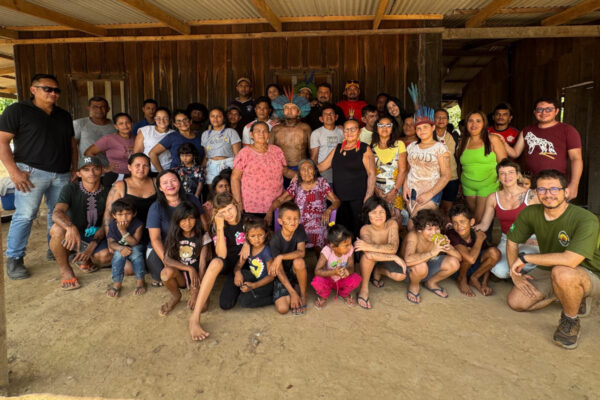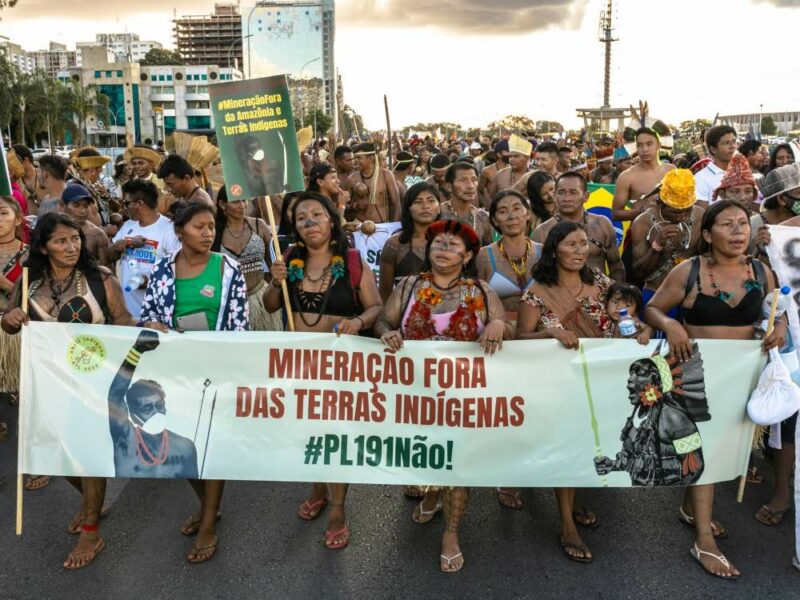Quito, Ecuador – While President Daniel Noboa visits Canada to seek private investments for Ecuador’s renewable energy sector, its mining industry remains at clear odds with a “just transition.” Canadian company Solaris Resources, owner of the contested Warintza copper-gold mine deep in the Ecuadorian Amazon, submitted an Environmental Impact Assessment (EIA) amid growing social-environmental conflict in Indigenous Shuar territory.
Since April, this conflict has considerably intensified due to the controversial Warintza project, which has yet to undergo proper consultation. On March 14 of this year, the ILO concluded that Warintza and the nearby San Carlos Panantza project did not comply with the appropriate consultation standards as delineated in ILO Convention 169.
In its reporting, Solaris has continually failed to disclose the longstanding opposition not only from the Indigenous Shuar Arutam Peoples (PSHA) but other principal Indigenous federations since it acquired Lowell Minerals Exploration and its Warintza project in 2018. The project remains at the center of social divisions among the communities who have historically opposed mining on their territories.
In July, the Inter-federational Committee of the Shuar-Achuar Peoples (that unites the principal Indigenous organizations based in the southeastern region of the Ecuadorian Amazon, the PSHA, NASHE, and FICSH) met to discuss plans for mining and oil projects in their territories. A statement reaffirming their rejection of destruction caused by mining in their territories reads:
“We energetically denounce and reject extractive companies that divide our communities through so-called peaceful dialogues with community authorities, as is the case of David Tankamash, the former president of the FICSH, who signed a cooperation agreement with transnational company Solaris in the 2024 Mining Expo in Canada.”
Other Indigenous communities that are affected directly by the project, such as Maikiuants, have previously voiced their opposition to Solaris, underscoring that the company fails to have the social license necessary to operate.
The release indicates that Solaris plans to transition its head office to Quito, implies that it continues to resent tightening regulations such as the Investment Canada Act (ICA), which contributed to the collapse of its deal with Chinese company, Zijin Mining. The company still remains under Canadian jurisdiction and subject to the ICA’s rules.
“As Solaris is hit hard with its lowest share prices in years, it is desperate to recover investor confidence by any means necessary, including signaling a change in jurisdiction and citing quotes from officials. However, the company still obfuscates that attempts to develop Warintza will remain an intense uphill battle due to the lack of consultation for the project. There’s no denying that investments into this company will still be subject to enhanced risk,” said Mary Mijares, Fossil Finance Campaigner at Amazon Watch.
“Instead of appealing to foreign investors about renewables in Ecuador, the Noboa administration must first confront the alarming consequences of expanding mining into the Amazon in highly biodiverse ecosystems and its implications for Indigenous peoples who have historically called for the halt of extractive operations on their territories.”
“The administration should safeguard the high standards of human rights and the rights of nature in Ecuador, which could impede the rapid development of such extractive projects. There exists a growing national movement that demands the end of extractive operations atop ecologically sensitive areas stewarded by Indigenous peoples, such as the passing of a historic referendum that would ban oil drilling in parts of the Ecuadorian Amazon, including Yasuní National Park, and mining in a forest near Quito,” said Nathaly Yépez, Amazon Watch Ecuador Legal Advisor.














